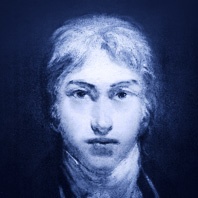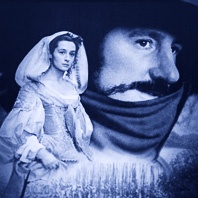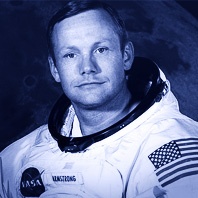Rubrik: Worth reading
The Rumanian fairytale »The shepherd in the Moon« tells the story of a shepherd:
He once came to a rich nobleman and received the gift of a piece of land and a herd of sheep from him. He settled as shepherd and began to play beautiful melodies on his flute at night, which – as you’ll find out later – reminds him of his deceased beloved. These songs were so wonderful that all sheep gathered around him to listen, even the ones of the neighbouring shepherds. They now became envious of the flute player and tried to blacken his name with the nobleman. But when he stuck by the shepherd with the flute, the other shepherds made attempts on the life of the good shepherd and tried to kill him. He escaped and left the country full of grief and pain.
Read more
Cyrano de Bergerac (1619–1655) was a French writer, who was less famous for his own pieces [*], but better known through the writings about him by Edmond Rostand (1868–1918) from 1897. The piece was called just like himself “Cyrano de Bergerac” and premiered as a stage play in Paris in the same year.
Up until today, it has been staged and filmed many times. The movie that is surely most famous is the one with Gerard Depardieu in the leading role from 1990. All dialogues are versified, which lends everything a historicizing but also an intense, poetic effect.
Read more
If you ask two lovers to which city they would like to travel to, to express their love, many will probably name two cities: Paris and Venice. While Paris embodies a variety of aspects of love, being the »city of love« (obviously also the erotic aspect), Venice stands especially for the romantic encounter between people. This must surely be the reason why so many weddings are celebrated and honeymoons are spent there.
Read more
Neil Alden Armstrong (1930–2012) was a US American astronaut, who was the first man to set foot on the Moon as the commander of the Apollo 11 mission on 20th July 1969, 8:17:58 pm (UTC), and hence the first to step on a foreign celestial body. The mission was preceded by fierce competition about the “reign” of space, between the then superpowers USA and Soviet Union, so that the success of Apollo 11 turned out to not only have a historical meaning but also had a political relevance.
Read more
Every once in a while, there is a “blue moon”. This is what you call the second full moon within a month. It happens from time to time, because the lunar cycle is shorter, with its averaging 29.5 days, than the normal calendar month. We have already described here why this double full moon is called “blue moon”.
Read more
Looking at the Moon, you can recognise the spots on the surface with the naked eye, which are termed lunar maria and have always been inspiring people’s imagination. It is actually molten rock that rose to the surface during the origin of the Moon and then hardened. If looked at closer and using a telescope as an aid, you are able to make out mountains and valleys and a large amount of craters. In short: they are landscapes that give our Moon its face.
Read more
We figured it would be obvious to look for the full moon in the works of England’s most famous poet William Shakespeare (1564–1616). Surprisingly, the »moon« is to be found more often, however the word »full moon« appears in the original text only once, namely in »King Lear«.
The text of the comedy »A Midsummer Night’s Dream« (approx. 1595), contains the moon a whopping 52 times (28 times in the last act alone) and it can be assumed that Shakespeare was thinking of the full moon when he wrote these lines. Although it is not described as the »full moon«.
Read more
Especially, because many people report that they are a bit
»out of it« at the full moon, it seems natural to think that more accidents could happen during this time. There are several studies [*], which have carefully examined both, the full moon and also other moon phases with the continuous identical result: no recognisable correlation between the moon events and accidents.
Read more
A hotel on the Moon – that sounds quite utopian if not absurd. Fact is, there are people thinking about colonising and inhabiting space or other celestial bodies, since man has been busy flying into space. And if we believe the statements of different companies that are planning hotels beyond the Earth, there has to be a great demand. This would actually be also necessary to make this project lucrative. Or is it merely the prestige and publicity, which are reaped by such an undertaking and hence would justify it?
Read more
 Photography had not yet been invented when the British painter J. M. William Turner (1775–1851) created his painting »Fishermen at Sea« in 1796, where he depicts a nightly scenery at a tempestuous sea, which is lit by the full moon midst heavy clouds. This painting was the first exhibited oil painting by the then 21 year-old Turner and marked the beginning of a great career.
Photography had not yet been invented when the British painter J. M. William Turner (1775–1851) created his painting »Fishermen at Sea« in 1796, where he depicts a nightly scenery at a tempestuous sea, which is lit by the full moon midst heavy clouds. This painting was the first exhibited oil painting by the then 21 year-old Turner and marked the beginning of a great career.
Read more









 Photography had not yet been invented when the British painter J. M. William Turner (1775–1851) created his painting »Fishermen at Sea« in 1796, where he depicts a nightly scenery at a tempestuous sea, which is lit by the full moon midst heavy clouds. This painting was the first exhibited oil painting by the then 21 year-old Turner and marked the beginning of a great career.
Photography had not yet been invented when the British painter J. M. William Turner (1775–1851) created his painting »Fishermen at Sea« in 1796, where he depicts a nightly scenery at a tempestuous sea, which is lit by the full moon midst heavy clouds. This painting was the first exhibited oil painting by the then 21 year-old Turner and marked the beginning of a great career.